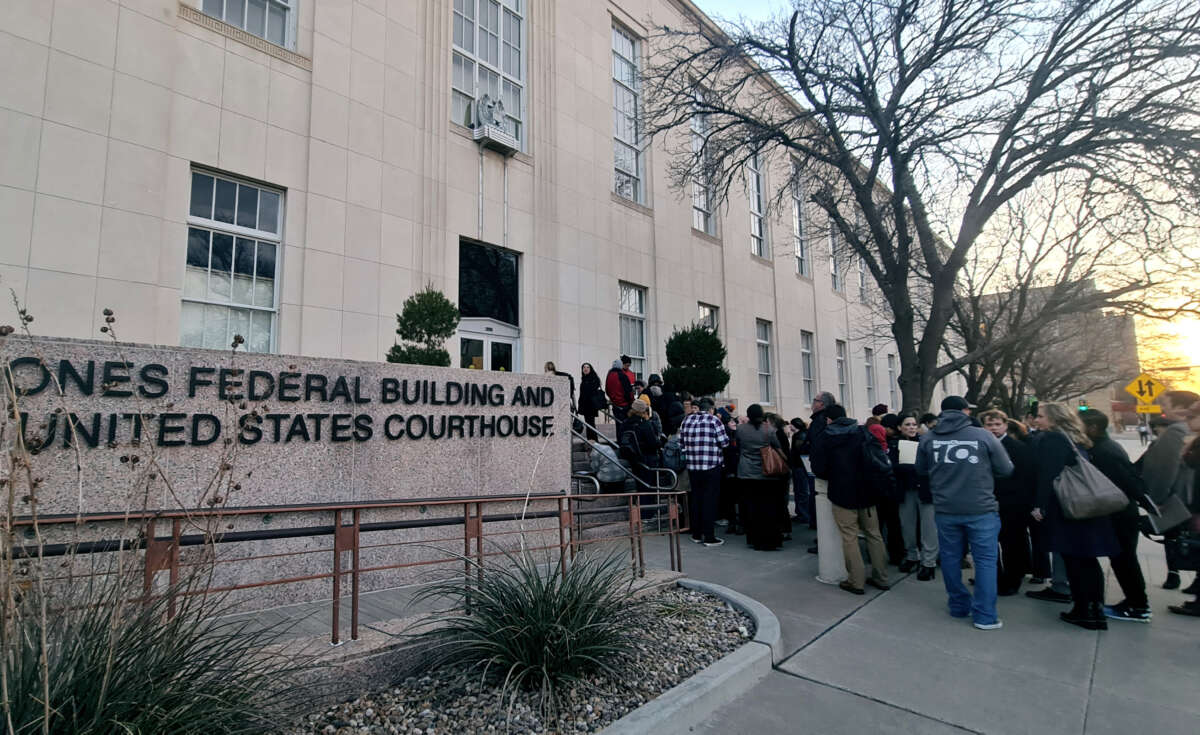On Wednesday, a federal judge in the case on the widely used abortion medication mifepristone indicated to courtroom observers that he was sympathetic to arguments for banning the drug, which is used in more than half of abortions nationwide.
A coalition of anti-abortion groups called the Alliance for Hippocratic Medicine is seeking to have mifepristone deemed illegal for use on the grounds that it wasn’t properly vetted by the Food and Drug Administration (FDA) decades ago. U.S. District Judge Matthew Kacsmaryk — who was appointed by Donald Trump after the former president promised to appoint anti-abortion judges — heard initial arguments on the case this week, and is currently considering whether to impose an injunction on use of the drug.
Data from 1988 and onward suggests that the drug is safe, and it has been used for decades without major incident. Though it was approved for use in France in 1988, mifepristone wasn’t approved for use in the United States until 2000, when the FDA used an accelerated approval process to allow the drug to be administered under strict regulations.
The FDA took more than four years to approve the drug, even with the accelerated process. When granting its approval, the agency stipulated that mifepristone could only be administered at hospitals, clinics and medical offices, and required that patients only use mifepristone under the supervision of a doctor. (Those conditions were relaxed this year, allowing patients to use the drug at home without supervision as long as it has been prescribed by a doctor.)
Several medical organizations have cited data showcasing that the drug is incredibly safe for use — safer than many other prescriptions and even over-the-counter medications, including Viagra, penicillin and Tylenol.
In deliberations on Wednesday, however, Kacsmaryk appeared to favor lawyers arguing for restrictions on the drug. Reporters for NBC News, for example, noted that Kacsmaryk seemed more willing to offer “windows” for plaintiffs to make their case than for the defense to clarify their arguments, “especially those related to the FDA’s approval process and the scope of a potential injunction.”
Washington Post reporter Caroline Kitchener, who covers stories relating to abortion and reproductive rights, noted that the Trump-appointed judge was more sympathetic to the plaintiffs’ cause.
“Kacsmaryk appeared to seriously entertain claims that mifepristone is unsafe — and asked plaintiffs for guidance on whether his court could order the FDA to withdraw approval,” Kitchener wrote on Twitter.
Federal government lawyers and lawyers representing the only drug manufacturing company listed in the lawsuit argued against the plaintiffs’ claims, noting that a ruling in their favor would be devastating for reproductive rights.
DOJ lawyer Julie Straus Harris argued that banning the drug, which has been used for more than 20 years, would be “unprecedented.” Jessica Ellsworth, a lawyer for drugmaker Danco Laboratories, argued against the notion that plaintiffs were trying to uphold FDA standards, saying that they instead intended to “upend the status quo” by making the drug unavailable for use.
At the end of the hearing on Wednesday, Kacsmaryk promised to make a decision “as soon as possible.”
Kacsmaryk’s decision is being watched across the country, as a temporary injunction would bar doctors from prescribing mifepristone in the U.S. Commentators have noted, however, that Kacsmaryk’s judicial powers are limited in this case — laws passed by Congress outline how the FDA can withdraw approval of a drug, and judicial precedent stands in the way of the judge ruling in the way that plaintiffs are requesting.
A ruling upending the distribution of the drug “would violate federal law,” according to Slate reporters David S. Cohen, Greer Donley and Rachel Rebouche. Further, a potential order from Kacsmaryk would only apply to the parties that are involved in the case — the FDA and Danco Laboratories. It would be an extreme judicial move, the reporters said, for him to ban all other manufacturers of mifepristone from being able to distribute the drug.
Such a ruling is still possible, however. During his confirmation hearings, Sen. Susan Collins (R-Maine) recognized that Kacsmaryk had demonstrated a “disregard for Supreme Court precedents.”
Kacsmaryk has also “made statements in opposition to reproductive rights” prior to his nomination by former President Donald Trump, said Elizabeth Sepper, a law professor at the University of Texas-Austin.
Join us in defending the truth before it’s too late
The future of independent journalism is uncertain, and the consequences of losing it are too grave to ignore. To ensure Truthout remains safe, strong, and free, we need to raise $24,000 by the end of today. Every dollar raised goes directly toward the costs of producing news you can trust.
Please give what you can — because by supporting us with a tax-deductible donation, you’re not just preserving a source of news, you’re helping to safeguard what’s left of our democracy.
